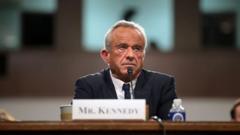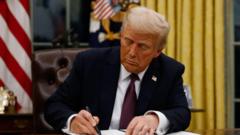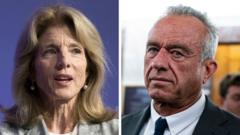President Trump's intention to withdraw the United States from the WHO raises concerns among public health experts about the potential loss of vital health data and America's diminishing role in global health initiatives, which might ultimately affect the health of American citizens.
Trump’s Withdrawal from WHO: Implications for American Health

Trump’s Withdrawal from WHO: Implications for American Health
The decision to exit the World Health Organization could have serious repercussions for U.S. health and global influence.
President Trump's controversial plan to withdraw the United States from the World Health Organization (WHO) could have far-reaching consequences not only for international health but also for Americans themselves. Experts warn that this decision may deplete the U.S. of critical scientific data regarding disease outbreaks and hinder the nation's participation in setting global health standards.
The WHO, though operating on a budget of $6.8 billion for 2024 and 2025—similar in size to that of Rhode Island's health department—plays an indispensable role in global health matters. Its programs support vaccination campaigns, epidemic control, and nutritional initiatives that several countries rely upon.
Experts point out that by stepping away from the WHO, the United States risks losing valuable insights into emerging public health threats like mpox, as well as diseases that are making a comeback, such as malaria and measles. Additionally, this withdrawal might empower rival nations, including Russia and China, to take a seat at the table in shaping global health policies, potentially undermining U.S. interests, particularly for domestic pharmaceutical and health tech companies.
The WHO’s influence extends into various aspects of American healthcare, from aiding in the development of diagnostic codes that doctors and insurance companies use to its global system for naming medicines. The agency is also key to flu surveillance, helping to set recommendations for seasonal flu vaccinations each year. It monitors antibiotic resistance while providing essential health alerts to American travelers and studying vital issues like mental health and aging—insights that feed directly into U.S. policy formulation.
As Loyce Pace, a former assistant secretary for health, aptly put it, "America, no matter how great we are, cannot do this work alone." The WHO was created to address shared challenges in health that transcend national borders, particularly evident in the wake of World War II.
While it will take about a year for the withdrawal to be finalized—if it even happens, as congressional approval might be necessary—Mr. Trump's announcement has already triggered mechanisms that could lead to significant cuts within the WHO. The fragility of global health systems and the international partnerships that support them stand to be tested if the U.S. proceeds with the withdrawal, potentially leaving American health interests out in the cold.























